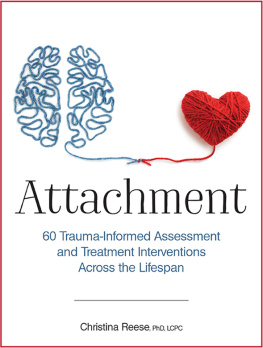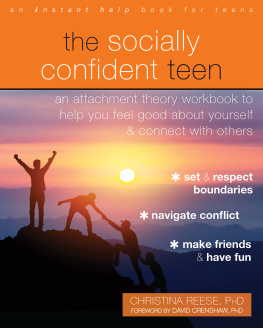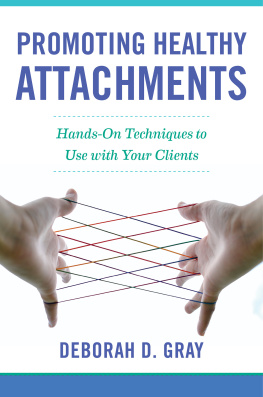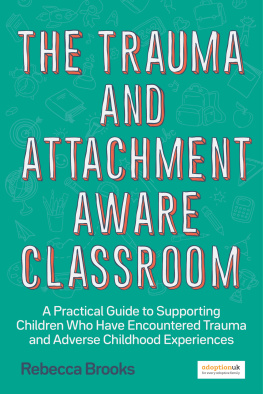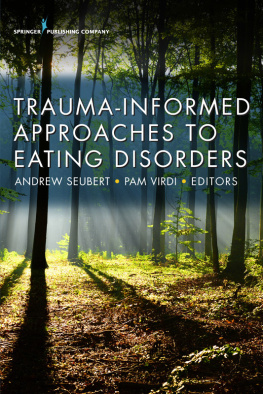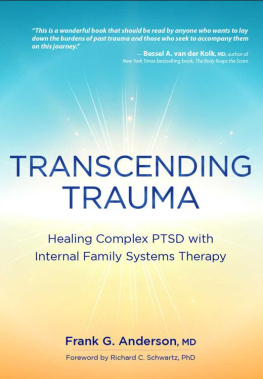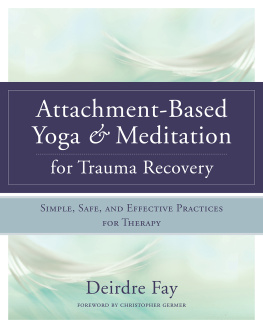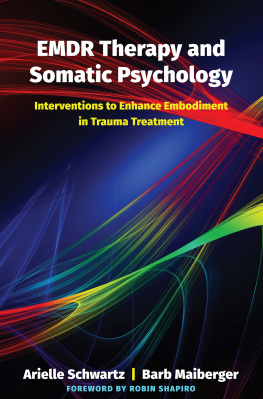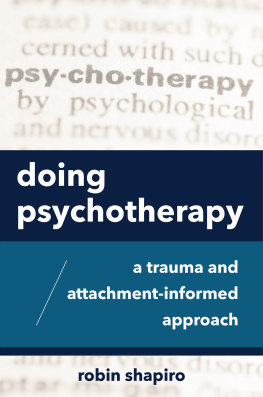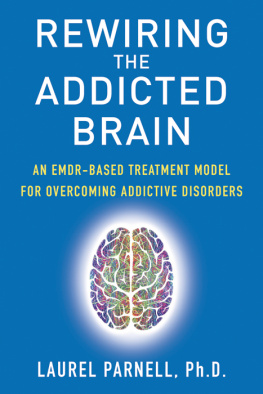Christina Reese - Attachment: 60 Trauma-Informed Assessment and Treatment Interventions Across the Lifespan
Here you can read online Christina Reese - Attachment: 60 Trauma-Informed Assessment and Treatment Interventions Across the Lifespan full text of the book (entire story) in english for free. Download pdf and epub, get meaning, cover and reviews about this ebook. year: 2018, publisher: PESI Pub, genre: Home and family. Description of the work, (preface) as well as reviews are available. Best literature library LitArk.com created for fans of good reading and offers a wide selection of genres:
Romance novel
Science fiction
Adventure
Detective
Science
History
Home and family
Prose
Art
Politics
Computer
Non-fiction
Religion
Business
Children
Humor
Choose a favorite category and find really read worthwhile books. Enjoy immersion in the world of imagination, feel the emotions of the characters or learn something new for yourself, make an fascinating discovery.
- Book:Attachment: 60 Trauma-Informed Assessment and Treatment Interventions Across the Lifespan
- Author:
- Publisher:PESI Pub
- Genre:
- Year:2018
- Rating:3 / 5
- Favourites:Add to favourites
- Your mark:
- 60
- 1
- 2
- 3
- 4
- 5
Attachment: 60 Trauma-Informed Assessment and Treatment Interventions Across the Lifespan: summary, description and annotation
We offer to read an annotation, description, summary or preface (depends on what the author of the book "Attachment: 60 Trauma-Informed Assessment and Treatment Interventions Across the Lifespan" wrote himself). If you haven't found the necessary information about the book — write in the comments, we will try to find it.
Christina Reese: author's other books
Who wrote Attachment: 60 Trauma-Informed Assessment and Treatment Interventions Across the Lifespan? Find out the surname, the name of the author of the book and a list of all author's works by series.
Attachment: 60 Trauma-Informed Assessment and Treatment Interventions Across the Lifespan — read online for free the complete book (whole text) full work
Below is the text of the book, divided by pages. System saving the place of the last page read, allows you to conveniently read the book "Attachment: 60 Trauma-Informed Assessment and Treatment Interventions Across the Lifespan" online for free, without having to search again every time where you left off. Put a bookmark, and you can go to the page where you finished reading at any time.
Font size:
Interval:
Bookmark:

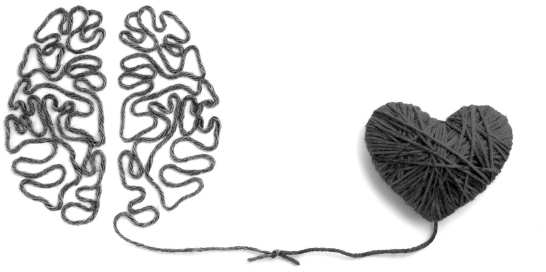
and Treatment Interventions
Across the Lifespan
Christina Reese, PhD, LCPC
Copyright 2018 Christina Reese
Published by:
PESI Publishing & Media
PESI, Inc
3839 White Ave
Eau Claire, WI 54703
Cover: Amy Rubenzer
Editing: Jenessa Jackson
Layout: Amy Rubenzer & Bookmasters
ISBN: 9781683731672
All rights reserved
Proudly printed in the United States of America
| PESI |

Dr. Christina Reese is a licensed clinical professional counselor in Maryland and Pennsylvania and a licensed clinical supervisor in Maryland. Dr. Reese has almost 20 years of experience working with children and families in areas of trauma, depression, anxiety, bipolar, ADHD, ODD and attachment (in foster care and adoption). She has been the director of a mental health clinic, worked in residential treatment centers, group homes, homeless shelters, with gang members and in private practice.
She is the founder of Felicity Counseling Services and travels nationally with PESI, speaking on topics of working with children in therapy, focusing on problem behaviors, trauma informed classrooms and attachment. She works in Baltimore with children and families, and leads a support group for adoptive parents. Her passion is working on attachment with adoptive families, coming alongside them to build strong families based in trust and healthy attachment.
To my parents and brothers, who were my first attachments
and who taught me how to connect Thank you.
To my husband, who connects with me every day in every way I love you.
To my daughter, who is still learning about
attachment and connection I am here to walk with you.
To my best friend, who taught me everything I know about attaching
to someone you are not biologically related to I am thankful for you.
To God, thank you for the gift of connection and for
making us with a desire to connect.
And finally, to my aunt, who told me
a long time ago to write what I know I did!
Attachment Across the Lifespan
Melissa walked into my office and said, Every relationship I have ends badly, and I dont know what to do. I want to feel close to someone. In asking about her history, I learned that she had several attachment traumas that were impacting her current ability to attach and connect with others. Melissas mother died when she was three years old, following a long battle with cancer. In this first attachment trauma, Melissa experienced a ruptured attachment with her mother, who was unable to care for and connect with her, due to illness, prior to her death. This attachment was then lost. Melissas father, who struggled with depression following his wifes death, was unable to connect with her and meet her emotional needs in a meaningful way. This second attachment trauma continued to impact her ability to feel close to adults and trust them to care for her. Melissas father remarried when she was 10, and her new stepmother was warm and caring, helping her to feel connected and cared for. When Melissas father and stepmother divorced 12 years later when the client was 22, she experienced her third attachment trauma as her stepmother moved halfway across the country and had substantially less contact with her. Melissa had lost the only person that she felt close to, and now seven years later, at the age of 29 she had been involved in several relationships that all ended when she put up walls around her heart to protect it from further pain. These attachment traumas interfered with her ability to find closeness with others or develop the connection required to maintain a healthy relationship.
As we began to explore how each of these traumas impacted Melissas view of relationships, she was able to see that she could make choices and changes to pursue healthy relationships. Once we defined what healthy relationships involved, Melissa began practicing those skills until she was able to establish a healthy relationship, build trust, develop a connection with that person, and improve her quality of life.
Attachment is missing in many homes and relationships. Our society has become so individualistic and independent that people feel alone to deal with challenges that they face, which can often make a hard situation seem overwhelming. In the 1930s, 40s, and 50s, our society was more community-focused, with neighbors sitting in their yards in the evenings talking, women getting together to have coffee in the afternoons and talking, men playing sports on the weekends and talking, and spouses taking walks in the evening and talking. We have moved away from our community base and into a more isolated space. We often dont know the names of our neighbors, we speak to our friends through text and phone, and we play video games with people halfway around the world whom we will never meet in person. Missing is the eye contact that is so important for connection. Missing is the ability to take someones hand or touch their shoulder as they share a vulnerability. We have lost the ability to connect with those around us.
It is no surprise that as our society has become more individualistic and isolated, the need for mental health services has skyrocketed. People now need professionals to help them problem-solve and understand relationships. The challenges that people face in trying to establish and maintain relationships are ones that are new to our technologically-advanced society. If everyone had a good friend, someone to connect with, who accepted them for who they are and helped them to problem-solve the challenges in their life, then there would be a lesser need for therapists. There would still be a need to assist those in crisis and who have chronic mental illness, but those who seek therapy for more solution-focused brief approaches to their relationship problems may be able to find support in the context of community relationships.
The need for connection is larger now than ever before, as a large portion of the population is struggling to connect with others in healthy, meaningful relationships. The divorce rate is a testament to broken attachments and our inability, as a society, to maintain connection, especially through hard times and challenges. Challenges can unite or divide a relationship, and the key to keeping the relationship united during these times is connection and the ability to problem-solve together through healthy communication.
The ability to parent effectively is also challenging to many families. Parenting must begin with connection, and if parents feel like they didnt have a healthy connection with their own parent, then they will have an even more difficult time creating a healthy connection with their own child. Without that connection, it is virtually impossible to parent effectively. For a child to listen to and respect his or her parents, trust must be present, and this trust comes from a connected relationship.
Font size:
Interval:
Bookmark:
Similar books «Attachment: 60 Trauma-Informed Assessment and Treatment Interventions Across the Lifespan»
Look at similar books to Attachment: 60 Trauma-Informed Assessment and Treatment Interventions Across the Lifespan. We have selected literature similar in name and meaning in the hope of providing readers with more options to find new, interesting, not yet read works.
Discussion, reviews of the book Attachment: 60 Trauma-Informed Assessment and Treatment Interventions Across the Lifespan and just readers' own opinions. Leave your comments, write what you think about the work, its meaning or the main characters. Specify what exactly you liked and what you didn't like, and why you think so.

